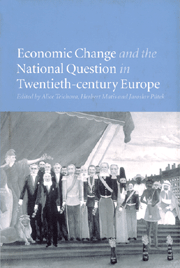Book contents
- Frontmatter
- Contents
- List of figures
- List of tables
- Notes on contributors
- Acknowledgements
- Introduction
- 1 Nationalism and the economic question in twentieth-century Ireland
- 2 Economic aspects of the nationality problem in nineteenth- and twentieth-century Belgium
- 3 The economy as a pushing or retarding force in the development of the German question during the second half of the twentieth century
- 4 Lusatian Sorbs in Germany before the Second World War: the influence of the economy on the national question
- 5 Unequal regional development in Switzerland: a question of nationality?
- 6 The Portuguese national question in the twentieth century: from Spanish threat to European bliss
- 7 From autarky to the European Union: nationalist economic policies in twentieth-century Spain
- 8 The economic background to the Basque question in Spain
- 9 Economic change and nationalism in Italy in the twentieth century
- 10 National integration and economic change in Greece during the twentieth century
- 11 National identity and economic conditions in twentieth-century Austria
- 12 Economic, social and political aspects of multinational interwar Czechoslovakia
- 13 Nationality and competition: Czechs and Germans in the economy of the First Czechoslovak Republic (1918–1938)
- 14 Economic aspects of Slovak national development in the twentieth century
- 15 Economic change and national minorities: Hungary in the twentieth century
- 16 Economic background to national conflicts in Yugoslavia
- 17 Economic differentiation and the national question in Poland in the twentieth century
- 18 Economy and ethnicity in the hands of the state: economic change and the national question in twentieth-century Estonia
- 19 Changing structure and organisation of foreign trade in Finland after Russian rule
- 20 Economic change and the national question in twentieth–century USSR/Russia: the enterprise level
- Index
15 - Economic change and national minorities: Hungary in the twentieth century
Published online by Cambridge University Press: 01 September 2009
- Frontmatter
- Contents
- List of figures
- List of tables
- Notes on contributors
- Acknowledgements
- Introduction
- 1 Nationalism and the economic question in twentieth-century Ireland
- 2 Economic aspects of the nationality problem in nineteenth- and twentieth-century Belgium
- 3 The economy as a pushing or retarding force in the development of the German question during the second half of the twentieth century
- 4 Lusatian Sorbs in Germany before the Second World War: the influence of the economy on the national question
- 5 Unequal regional development in Switzerland: a question of nationality?
- 6 The Portuguese national question in the twentieth century: from Spanish threat to European bliss
- 7 From autarky to the European Union: nationalist economic policies in twentieth-century Spain
- 8 The economic background to the Basque question in Spain
- 9 Economic change and nationalism in Italy in the twentieth century
- 10 National integration and economic change in Greece during the twentieth century
- 11 National identity and economic conditions in twentieth-century Austria
- 12 Economic, social and political aspects of multinational interwar Czechoslovakia
- 13 Nationality and competition: Czechs and Germans in the economy of the First Czechoslovak Republic (1918–1938)
- 14 Economic aspects of Slovak national development in the twentieth century
- 15 Economic change and national minorities: Hungary in the twentieth century
- 16 Economic background to national conflicts in Yugoslavia
- 17 Economic differentiation and the national question in Poland in the twentieth century
- 18 Economy and ethnicity in the hands of the state: economic change and the national question in twentieth-century Estonia
- 19 Changing structure and organisation of foreign trade in Finland after Russian rule
- 20 Economic change and the national question in twentieth–century USSR/Russia: the enterprise level
- Index
Summary
In a recent article, Heinrich August Winkler pointed out a general characteristic of research on nationalism: ‘Until recently the history of nationalism … has mainly been treated as the history of its thinkers, with the focus on ideas and not on interests. The research methods have been those of the intellectual historian and not of the social historian. They tend to be phenomenalist rather than analytical.’ This statement could be complemented by another, namely that the aspects of economic history have also hardly been taken into account when studying not only the questions of nationalism but the problems of ethnic minorities and national identity. Although these are complex phenomena and it would be an oversimplification to explain them in purely economic terms, they are strongly intertwined with economic matters.
In the case of Hungary, the connection between economic transformation and national assimilation has been evaluated in very different ways. On the one hand some authors state that modernisation leads to the assimilation of ethnicminorities: ‘it is undeniable that a natural assimilation was taking place, especially in the fast developing towns and industrial centres. The natural assimilation went on understandably as a result of modernization and industrialization. Therefore this affected those nations with a more modern social structure, whereas those with a more archaic structure resisted more effectively.’
- Type
- Chapter
- Information
- Publisher: Cambridge University PressPrint publication year: 2000

